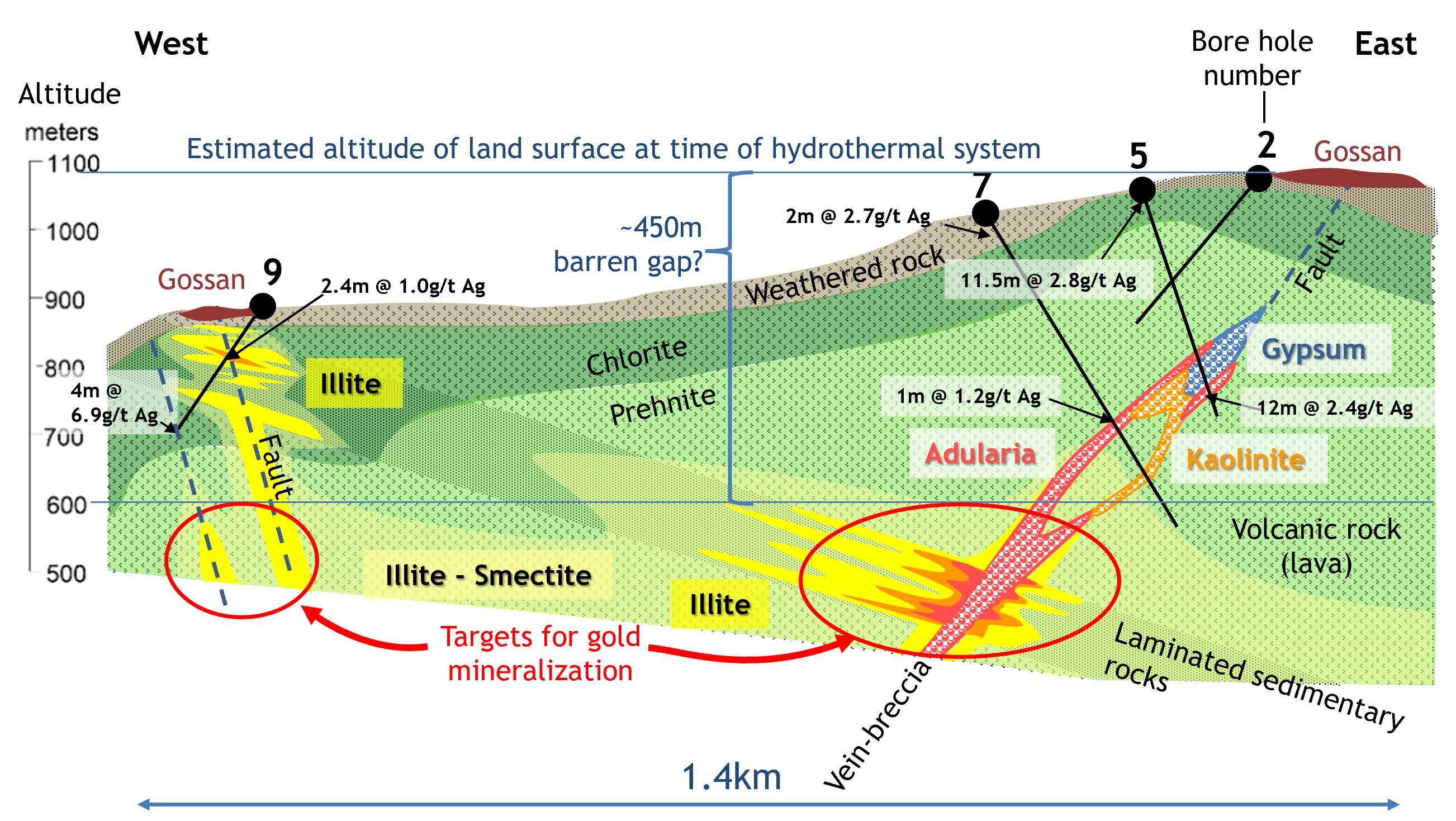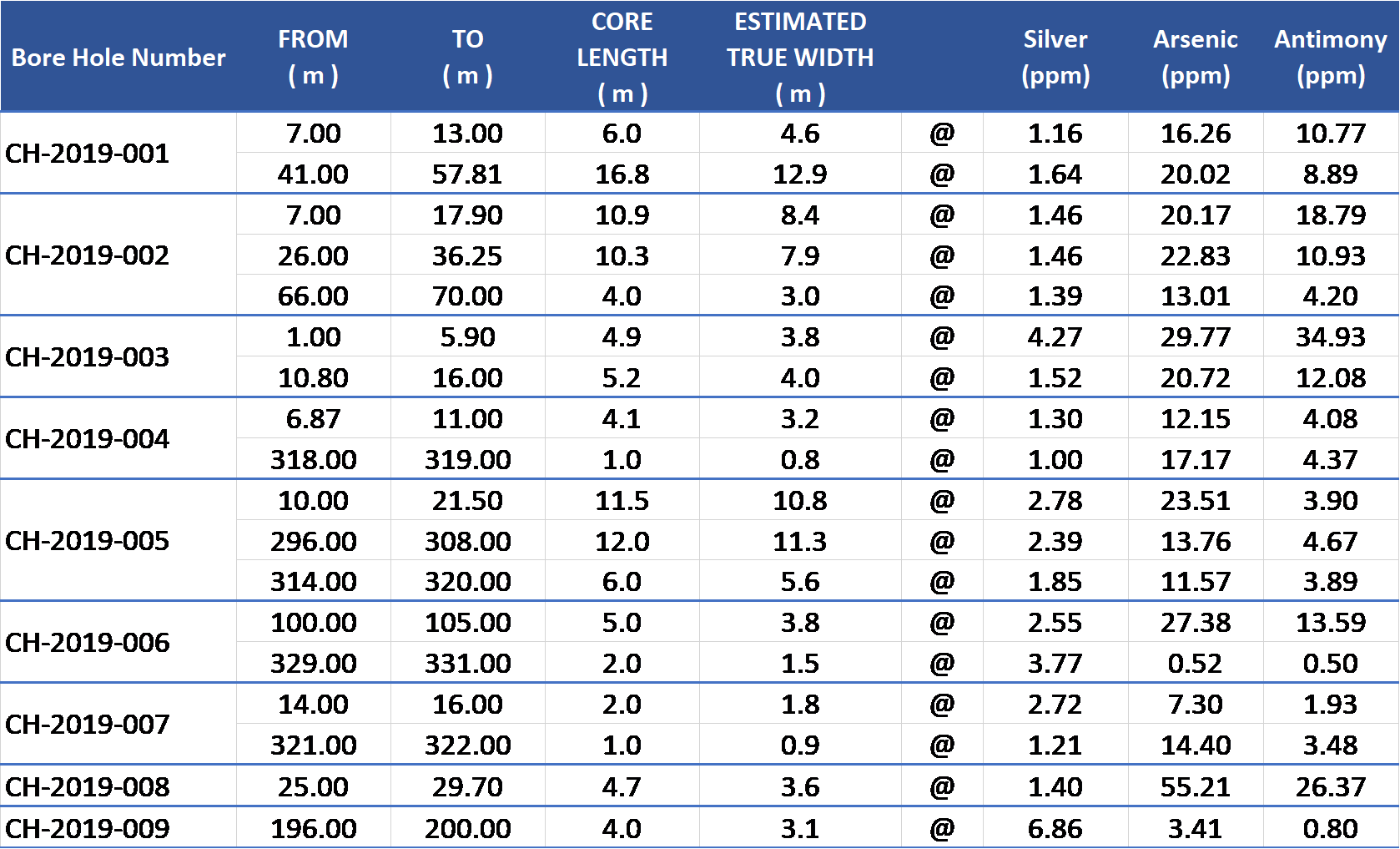Aurania Reports that Drilling at Crunchy Hill Intersected the Upper Part of an Epithermal System
Toronto, Ontario, June 13, 2019 – Aurania Resources Ltd. (TSXV: ARU) (OTCQB: AUIAF) (Frankfurt: 20Q) (“Aurania” or the “Company”) reports that it has completed its scout drilling campaign at Crunchy Hill and has received all assays and results of detailed studies of alteration minerals in the drill core. The exploration model developed from these data suggests that the scout drilling at Crunchy Hill intersected the very upper part of an epithermal system.
Dr. Keith Barron, Chairman and CEO commented, “I’m encouraged by the success of our scout drilling – the first-ever mineral exploration drilling in the Cordillera del Cutucu in southeastern Ecuador. We have used a multidisciplinary approach, including geology, geochemistry, mineral textures and spectral data measured from the core, to confirm the presence of an epithermal system and have learned that the targeted gold zone is deeper than was initially modelled. All this has taken time but should pay dividends longer term as these concepts are applied to the drilling of our extensive list of epithermal gold targets.”
Aurania’s President, Dr. Richard Spencer added, “With the receipt of the final assays and detailed alteration mineral data from the nine holes drilled at Crunchy Hill, we finally have the relevant building blocks to refine our understanding of the target. The campaign at Crunchy Hill achieved what scout drilling is designed to accomplish: it confirmed the presence of an epithermal system and has indicated where we would need to drill to intersect the heart of the system where associated gold would be expected.”
“Our plan is to “bank” Crunchy Hill and to scout drill the growing list of other epithermal targets that have been identified by our reconnaissance exploration crews. When one has a long list of targets, the objective of scout drilling is to identify, as efficiently and cost-effectively as possible, which ones have the highest potential to host the best deposits. The next area highlighted for scout drilling is Yawi. However, from our experience at Crunchy Hill, where the core of the mineralizing system is deeper than expected, we are considering a short, focused geophysical program prior to drilling. We intend to keep one drill rig focused on epithermal targets for gold mineralization while mobilizing a second man-portable rig to start drilling copper-silver targets later in 2019.”
Mineral Alteration and Mineralization
Drilling at Crunchy Hill intersected two zones that could contain gold mineralization at depth; one intersected by boreholes CH-005 and CH-007 (the “5-7 structure”) and one cut by borehole CH-009 (the “9 structure”) (Figure 1). All boreholes returned intersections of low grade but anomalous silver, with pathfinder element (arsenic, antimony, selenium, and thallium) enrichment as well as zones of moderate to intense silicification with disseminated pyrite.
The principal target on the 5-7 structure lies where the vein-breccia cuts the laminated sedimentary layer intersected in bore hole CH-009, at a depth of approximately 450m beneath the collar of hole CH-007 as illustrated in Figure 1. The sedimentary layer is approximately 100m thick and contains carbon, which is extremely efficient at precipitating gold from hydrothermal fluids – hence our expectation of gold mineralization in layers within the sedimentary rock, as well as in veins in the adjacent brittle lava.
The target on the 9 structure is a quartz vein developed on the depth extension of the weakly mineralized fracture zone intersected in hole CH-009. The target concept is that the gold zone lies at a depth of approximately 450m below the estimated position of the land surface at the time of mineralization – about 300m below the drill platform from which bore hole CH-009 was drilled, as illustrated in Figure 1.
Figure 1. Vertical cross section through Crunchy Hill showing bore hole intercepts (silver grades (“Ag” = silver), host rock and alteration mineral zoning.
Table 1. Summary of principal intercepts from the scout drilling at Crunchy Hill.
Drilling
Nine diamond drill holes were completed at Crunchy Hill for a total of 3,204m.
Next Steps
Rather than embarking on a second round of deeper drilling aimed to intersect potential gold zones at Crunchy Hill, Management has decided to move ahead with scout drilling of other epithermal targets in the Lost Cities – Cutucu Project. The next area being prepared for scout drilling is the first of three targets at Yawi.
Our conclusion from the drilling at Crunchy Hill is that the “barren gap” between the altitude of the old land surface present at the time that the epithermal system developed, and the heart of the system where the highest gold grades should be, is at least 450m (Figure 1). Assuming that the epithermal system at Yawi is similar, we are evaluating whether we should use additional geophysics to refine the targets at Yawi. These targets have been developed using data from soil geochemistry, mineral alteration and geological mapping – all of this information is from surface. Induced polarization (“IP”) is a geophysical technique designed to identify possible areas of resistivity (which is usually associated with quartz) or conductivity, which may indicate the presence of sulphides, to a depth of approximately 500m. Quotations for an IP survey over the three defined targets at Yawi are currently being evaluated – and scout drilling may be delayed there until an IP survey has been completed on the first of the three targets. Drilling could commence on the first target while an IP survey is completed on the other two targets at Yawi.
Preparatory work is also being undertaken for scout drilling to commence on copper-silver targets later in 2019.
Sample Analysis & Quality Assurance / Quality Control (“QAQC”)
Core was cut and half-core samples were prepared for analysis at MS Analytical in Cuenca, Ecuador. The core samples were jaw-crushed to 10 mesh (crushed material passes through a mesh with apertures of 2 millimetres (“mm”)), from which a one-kilogram sub-sample was taken. The sub-sample was crushed to a grain size of 0.075mm and a 200 gram (“g”) split was set aside for analysis.
Aurania personnel inserted a certified standard pulp sample, a quarter-core sample and a field blank, each of which is alternated at intervals of approximately 20 samples in all batches.
Samples prepared by MS Analytical were sent to its assay facility in Vancouver for analysis. Approximately 0.25g of rock pulp underwent four-acid digestion and analysis for 48 elements by ICP-MS.
MS Analytical reported that the analyses had passed their internal QAQC tests. In addition, Aurania’s analysis of control samples showed that they passed its internal QAQC standards.
Qualified Person
The technical information contained in this news release has been verified and approved by Jean-Paul Pallier, MSc. Mr. Pallier is a designated EurGeol by the European Federation of Geologists and is a Qualified Person as defined by National Instrument 43-101, Standards of Disclosure for Mineral Projects of the Canadian Securities Administrators.
About Aurania
Aurania is a junior mineral exploration company engaged in the identification, evaluation, acquisition and exploration of mineral property interests, with a focus on precious metals and copper. Its flagship asset, The Lost Cities – Cutucu Project, is located in the Jurassic Metallogenic Belt in the eastern foothills of the Andes mountain range of southeastern Ecuador.
Information on Aurania and technical reports are available at www.aurania.com and www.sedar.com, as well as on Facebook at https://www.facebook.com/auranialtd/, Twitter at https://twitter.com/auranialtd, and LinkedIn at https://www.linkedin.com/company/aurania-resources-ltd-.
For further information, please contact:
| Carolyn Muir
Manager – Investor Services Aurania Resources Ltd. (416) 367-3200 |
Dr. Richard Spencer
President Aurania Resources Ltd. (416) 367-3200 |
Neither the TSX Venture Exchange nor its Regulation Services Provider (as that term is defined in the policies of the TSX Venture Exchange) accepts responsibility for the adequacy or accuracy of this release.
Forward-Looking Statements
This news release may contain forward-looking information that involves substantial known and unknown risks and uncertainties, most of which are beyond the control of Aurania. Forward-looking statements include estimates and statements that describe Aurania’s future plans, objectives or goals, including words to the effect that Aurania or its management expects a stated condition or result to occur. Forward-looking statements may be identified by such terms as “believes”, “anticipates”, “expects”, “estimates”, “may”, “could”, “would”, “will”, or “plan”. Since forward-looking statements are based on assumptions and address future events and conditions, by their very nature they involve inherent risks and uncertainties. Although these statements are based on information currently available to Aurania, Aurania provides no assurance that actual results will meet management’s expectations. Risks, uncertainties and other factors involved with forward-looking information could cause actual events, results, performance, prospects and opportunities to differ materially from those expressed or implied by such forward-looking information. Forward looking information in this news release includes, but is not limited to, Aurania’s objectives, goals or future plans, statements, exploration results, potential mineralization, the corporation’s portfolio, treasury, management team and enhanced capital markets profile, the estimation of mineral resources, exploration and mine development plans, timing of the commencement of operations and estimates of market conditions. Factors that could cause actual results to differ materially from such forward-looking information include, but are not limited to, failure to identify mineral resources, failure to convert estimated mineral resources to reserves, the inability to complete a feasibility study which recommends a production decision, the preliminary nature of metallurgical test results, delays in obtaining or failures to obtain required governmental, regulatory, environmental or other project approvals, political risks, inability to fulfill the duty to accommodate indigenous peoples, uncertainties relating to the availability and costs of financing needed in the future, changes in equity markets, inflation, changes in exchange rates, fluctuations in commodity prices, delays in the development of projects, capital and operating costs varying significantly from estimates and the other risks involved in the mineral exploration and development industry, and those risks set out in Aurania’s public documents filed on SEDAR. Although Aurania believes that the assumptions and factors used in preparing the forward-looking information in this news release are reasonable, undue reliance should not be placed on such information, which only applies as of the date of this news release, and no assurance can be given that such events will occur in the disclosed time frames or at all. Aurania disclaims any intention or obligation to update or revise any forward-looking information, whether as a result of new information, future events or otherwise, other than as required by law.





